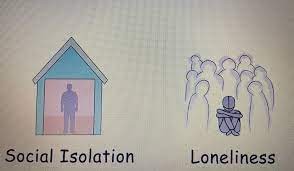Social Isolation
Social Isolation
 Social isolation is the lack of meaningful contact or interaction with other people. It can result from factors such as:
Social isolation is the lack of meaningful contact or interaction with other people. It can result from factors such as:
- Loss of spouse, friends or relatives due to death, divorce or relocation
- Decreased mobility or transportation due to physical limitations or lack of access
- Decreased hearing or vision due to sensory impairments
- Decreased communication skills due to cognitive impairments or language barriers
- Decreased social skills due to depression, anxiety or personality changes
Social isolation can have adverse effects on the older adult’s physical and mental health such as:
- Increased risk of cardiovascular disease, infection, dementia or mortality
- Decreased immune function, wound healing and pain tolerance
- Decreased cognitive function, memory and learning ability
- Decreased self-esteem, self-efficacy and coping skills
- Increased depression, anxiety, loneliness and suicidal ideation
Social isolation can be prevented or reduced by providing interventions such as:
- Assessing the older adult’s social network, support system and preferences
- Encouraging the older adult to maintain contact with family, friends and neighbors
- Facilitating the older adult’s participation in community activities or events that match their interests, abilities and values
- Providing assistive devices or adaptive equipment to enhance hearing, vision or mobility
- Providing transportation or escort services to enable access to social venues
- Referring the older adult to social services or agencies that offer companionship, respite or home care
Nursing Test Bank
Quiz #1: RN Exams Pharmacology Exams
Quiz #2: RN Exams Medical-Surgical Exams
Quiz #3: RN Exams Fundamentals Exams
Quiz #4: RN Exams Maternal-Newborn Exams
Quiz #5: RN Exams Anatomy and Physiology Exams
Quiz #6: RN Exams Obstetrics and Pediatrics Exams
Quiz #7: RN Exams Fluid and Electrolytes Exams
Quiz #8: RN Exams Community Health Exams
Quiz #9: RN Exams Promoting Health across the lifespan Exams
Quiz #10: RN Exams Multidimensional care Exams
Naxlex Comprehensive Predictor Exams
Quiz #1: Naxlex RN Comprehensive online practice 2019 B with NGN
Quiz #2: Naxlex RN Comprehensive Predictor 2023
Quiz #3: Naxlex RN Comprehensive Predictor 2023 Exit Exam A
Quiz #4: Naxlex HESI Exit LPN Exam
Quiz #5: Naxlex PN Comprehensive Predictor PN 2020
Quiz #6: Naxlex VATI PN Comprehensive Predictor 2020
Quiz #8: Naxlex PN Comprehensive Predictor 2023 - Exam 1
Quiz #10: Naxlex HESI PN Exit exam
Quiz #11: Naxlex HESI PN EXIT Exam 2
Questions on Social Isolation
Correct Answer is ["A","D"]
Explanation
<p>This is wrong because having poor hygiene and grooming habits does not imply that the client is socially isolated or lonely.</p>
<p>Poor hygiene and grooming habits can be a result of various factors, such as depression, dementia, physical disability, or lack of resources.</p>
<p>They can also affect the client’s self-esteem and social interactions, but they are not necessarily caused by social isolation or loneliness.</p>
Correct Answer is ["A","B","D"]
Explanation
<p>This is wrong because restricting the clients’ access to media or technology that may cause stress or anxiety is not an effective way to prevent or reduce social isolation.Media or technology can be a source of information, communication and entertainment for older adults, and can help them stay connected with their family, friends and community.</p>
<p>Instead of restricting access, the nurse should help the clients use media or technology safely and appropriately, and provide them with alternative sources of positive stimulation.</p>
<p>This is wrong because it suggests that the client should find new relationships to replace his wife, which can be insensitive and unrealistic.</p>
<p>This can make the client feel pressured and guilty.</p>
<p>This is wrong because it does not address the client’s social isolation, but only provides a change of scenery.</p>
<p>Social isolation is a common problem among older adults, especially those who live alone or have cognitive impairment.It can lead to depression, anxiety, loneliness, and
Search Here
Related Topics
- Effects of Immobility on Body Systems - Care Of The Older Adult
- Assessment and Prevention of Immobility Complications - Care Of The Older Adult
- Positioning Techniques - Care Of The Older Adult
- Mobilization and Safe Transfer Techniques - Care Of The Older Adult
- Collaborative Care - Care Of The Older Adult
- Critical Thinking - Care Of The Older Adult
More on Nursing
- Mobility, Immobility and Positioning
- Critical Thinking and Nursing Process
- Oxygen Therapy and Respiratory Care (Oxygenation and Perfusion)
- Care of Patients with Chronic Illnesses
- Patient Assessment and Documentation
- End-of-life Care and Palliative Care
- Vital Signs Measurement
- Safety Fall
- Skin integrity and Basic wound care and dressing changes
- Nursing Ethics and Professionalism
Free Nursing Study Materials
Access to all study guides and practice questions for nursing for free.
- Free Nursing Study Trials
- Free Nursing Video tutorials
- Free Nursing Practice Tests
- Free Exam and Study Modes
- Free Nursing Revision Quizlets
